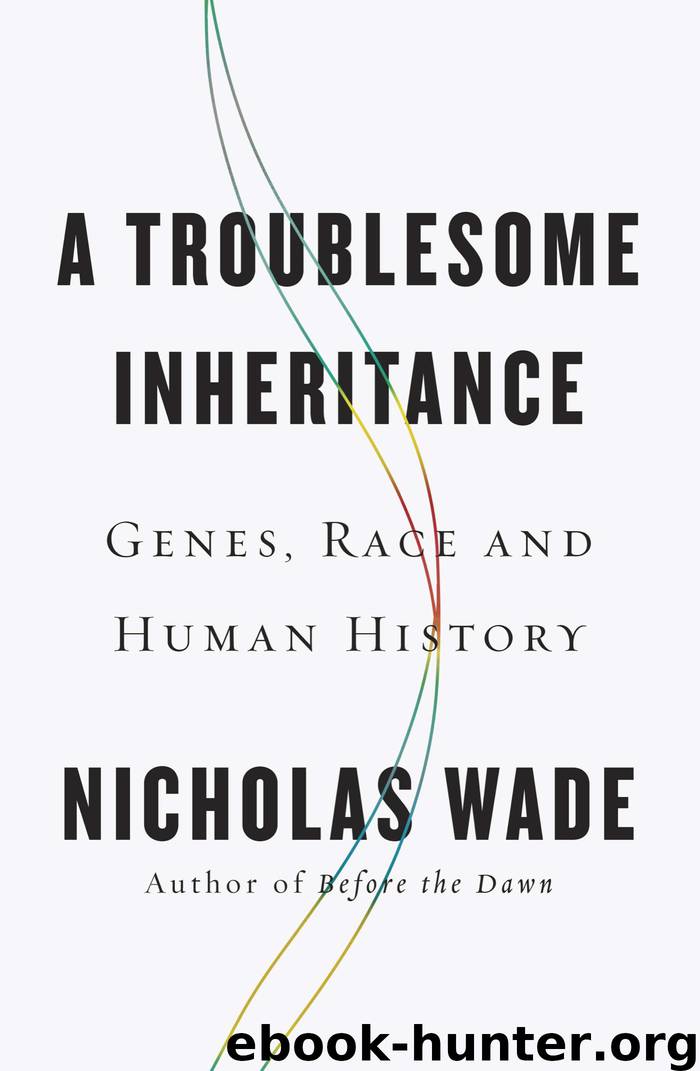A Troublesome Inheritance by Nicholas Wade

Author:Nicholas Wade
Language: eng
Format: epub
Publisher: Penguin Group US
Published: 2014-05-05T16:00:00+00:00
Effects on Social and Individual Behavior
From the broad sweep of Fukuyama’s analysis, a clear pattern emerges. Each of the major civilizations of Eurasia developed a characteristic set of institutions in response to its local circumstances and history. Given that institutions rest on a basis of human social behavior, and that culture feeds back into the genome, it is plausible to suppose that Chinese, Indians, Ottomans and Europeans have all adapted over the generations to their particular social conditions. Because of this evolutionary process, the four civilizations remain distinct today.
The social institutions of the four civilizations had considerable inertia, meaning that they changed very slowly over time. Institutions that endure for many generations are strong candidates for being rooted in a genetically framed social behavior that maintains their stability. East Asian societies have a distinctive character, tending to be efficient autocracies. Singapore, for instance, endowed at independence with a cultural heritage of English political institutions, nevertheless has become a looser version of the autocratic Chinese state despite retaining the outward forms of a European one.
A similar continuity in social behavior is evident in Africa, which has consisted largely of tribally organized societies both before and after the episode of colonial rule. European powers prepared their colonies for independence by imposing their own political institutions. But these had been developed over many centuries for the European environment. Considering the long historical process by which Europeans had rid themselves of tribalism, it is hardly surprising that African states did not become detribalized overnight. They reverted to the kind of social system to which Africans had become adapted during the previous centuries.
In tribal systems, people very rationally look to their relatives and tribal groupings for support, not to a central government, whose usual function has been to exact taxes or military service while giving back little in return. European or American institutions cannot easily be exported to tribal societies like those of Iraq or Afghanistan because they presuppose a large measure of trust toward non-kin and are designed to operate in the public interest, not to empower the officeholder and his tribe.
Variations in human social behavior and in the institutions that embody it have far-reaching consequences. Developmental economists long ago learned that it is not just lack of capital or resources that keeps countries poor. Billions of dollars’ worth of aid have been poured into Africa in the past half century with little impact on the standard of living. Countries like Iraq are rich in oil, but their citizens are poor. And countries with no resources, like Singapore, are rich.
What makes societies rich or poor is to a great extent their human capital—including the nature of the people, their levels of training, the cohesiveness of their societies, and the institutions with which they are organized. As Fukuyama notes, “Poor countries are poor not because they lack resources but because they lack effective political institutions.” 10
The same conclusion is reached in the recent book Why Nations Fail by the economist Daron Acemog˘lu and the political scientist James Robinson.
Download
This site does not store any files on its server. We only index and link to content provided by other sites. Please contact the content providers to delete copyright contents if any and email us, we'll remove relevant links or contents immediately.
| African-American Studies | Asian American Studies |
| Disabled | Ethnic Studies |
| Hispanic American Studies | LGBT |
| Minority Studies | Native American Studies |
Cecilia; Or, Memoirs of an Heiress — Volume 1 by Fanny Burney(32558)
The Great Music City by Andrea Baker(32019)
Cecilia; Or, Memoirs of an Heiress — Volume 2 by Fanny Burney(31956)
Cecilia; Or, Memoirs of an Heiress — Volume 3 by Fanny Burney(31942)
We're Going to Need More Wine by Gabrielle Union(19046)
All the Missing Girls by Megan Miranda(16029)
Pimp by Iceberg Slim(14508)
For the Love of Europe by Rick Steves(14121)
Bombshells: Glamour Girls of a Lifetime by Sullivan Steve(14077)
Talking to Strangers by Malcolm Gladwell(13370)
Norse Mythology by Gaiman Neil(13367)
Fifty Shades Freed by E L James(13243)
Mindhunter: Inside the FBI's Elite Serial Crime Unit by John E. Douglas & Mark Olshaker(9344)
Crazy Rich Asians by Kevin Kwan(9292)
The Lost Art of Listening by Michael P. Nichols(7506)
Enlightenment Now: The Case for Reason, Science, Humanism, and Progress by Steven Pinker(7314)
The Four Agreements by Don Miguel Ruiz(6765)
Bad Blood by John Carreyrou(6622)
Weapons of Math Destruction by Cathy O'Neil(6281)
